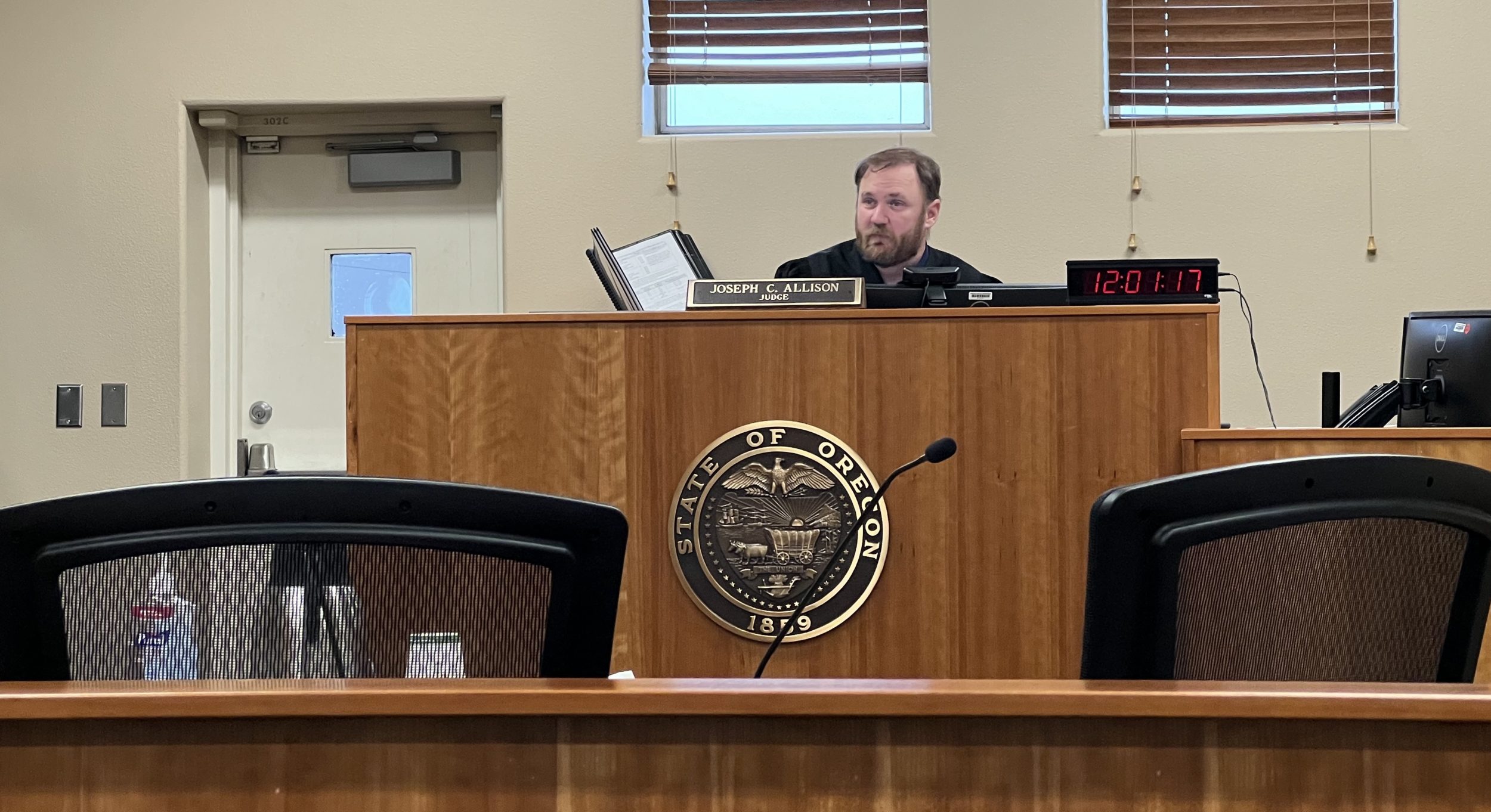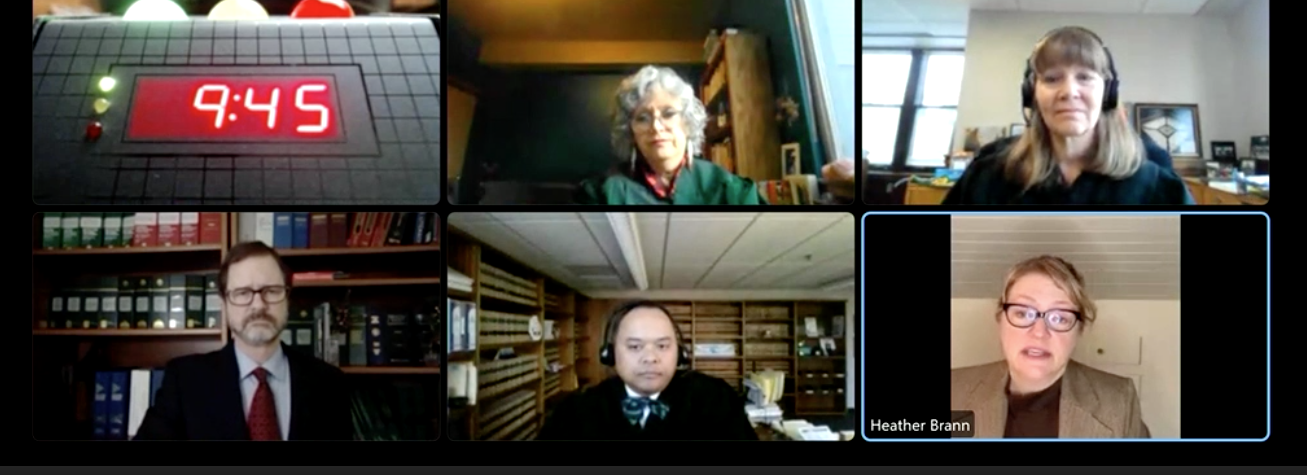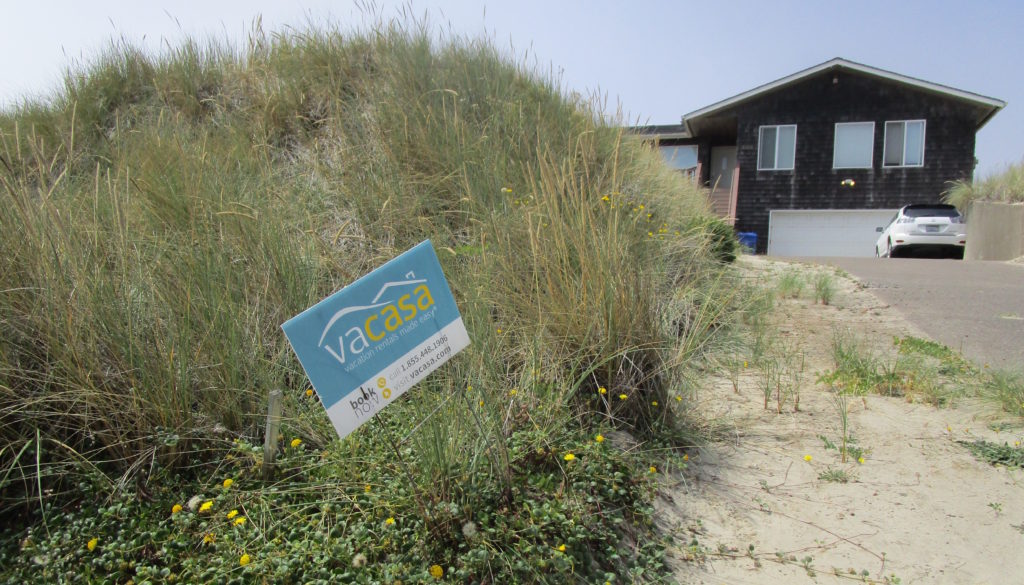
By QUINTON SMITH/YachatsNews
Lincoln County’s hotly contested ordinances regulating vacation rentals do not fall under Oregon’s land-use laws and the county can oversee them with its business licensing program, a circuit court judge said this week.
Lincoln County pro-tem judge Joseph Allison said during a hearing Monday that he has drafted most of his long-awaited ruling challenging the county’s short-term rental ordinance and that he intends to grant the county’s motion for summary judgment against all claims relying on land use law.
But Allison said some parts of the county’s year-old ordinance may be “unconstitutionally vague” and scheduled a Dec. 22 hearing on those.
During Monday’s hearing, Allison said his intention was to wrap up his decisions by the end of the year. But for a second time Allison said no matter what the ruling he expects the losing side to appeal to the Oregon Court of Appeals.
That’s already happened in one portion of the long-running and complicated issue.

The same day that Allison held his hearing, an appeals court panel heard arguments from the same lawyers battling it out in the Lincoln County court.
Vacation rental owners have appealed an Oregon Land Use Board of Appeals decision that said the county’s creation of seven geographic zones to more closely regulate rentals was not a land-use action.
No matter the case or venue, the attorney for rental owners argues that the county’s actions are really land-use decisions disguised as business license regulations.
Attorneys for the county have consistently argued the opposite, that the county can use licenses and regulations to oversee vacation rentals just like it does for other businesses like barber shops and grocery stores.
On Monday, Allison said he agreed with the county.
The judge said he planned to grant a motion from the county’s attorneys seeking “a summary judgment on claims that required a finding that a land-use decision had occurred.”
Opponents of vacation rentals in residential neighborhoods of unincorporated county hailed Allison’s ruling.
“The judge is saying the county can regulate short-term rentals by business licenses,” said Monica Kirk of Depoe Bay, one of the founders of 15neighborhoods, a citizens group that put a ballot measure before voters in 2021. “That’s a big deal.”
But Allison also said he was bothered by other parts of the county’s ordinance. For example, he told lawyers, the part of the ordinance prohibiting large events at vacation rentals or how it plans to set up an administrative hearings process for complaints seem “unconstitutionally vague.”
He asked the attorneys – Emily Matasar and Chris Crean for the county and Heather Brann for rental owners – to file briefs on the issue by Dec. 15 and then any responses to the other’s briefs by Dec. 20. He scheduled a hearing on the arguments for 10 a.m. Dec. 22.

The history
The county has been trying to get a handle on the burgeoning number of vacation rentals in unincorporated areas since 2016.
Stymied by the Labor Day 2020 fires, the Covid pandemic and the departure of its legal counsel, commissioners struggled for two years to work out regulations and put an ordinance in place.
That led to a citizen-led ballot measure on the November 2021 ballot to phase out vacation rentals in residential neighborhoods over five years. Commissioners tried unsuccessfully to undercut that measure by passing a number of changes to an existing ordinance just days before voters resoundingly approved it.
A coalition of property owners organized by Via Oregon appealed both the ballot measure and the updated county ordinance to the Oregon Land Use Board of Appeals, contending both were land-use measures.
LUBA ruled in August 2022 that the voter-approved ballot measure conflicted with Oregon land-use law and declared it invalid.
But the quasi-judicial body twice said the county’s revised ordinance was not a zoning or land-use issue, that it had no jurisdiction over it and sent the rental-owner’s lawsuit back to circuit court.
Vacation rental owners appealed one of the LUBA decisions to the Oregon Court of Appeals, which heard brief oral arguments on it Monday. The rental owners are challenging the part of the county ordinance that created seven geographic areas – or zones – where they then set specific densities and numbers for the number of vacation rental licenses.
LUBA’s decisions that it had no jurisdiction over the county’s rental ordinances threw the issue into the courtroom of Allison, a Newport attorney working as a temporary judge under a state contract to help the circuit court with its caseload.
Vacation rentals in unincorporated areas once numbered more than 600. Now there are 506, after the county prohibited the transfer of licenses to new owners and put a moratorium on issuing new ones in most unincorporated areas.
Under the county’s latest ordinance, they are supposed to eventually drop to 181 in five designated areas outside of the seven cities in Lincoln County.
The lawyer for 20 vacation rental owners and outside attorneys for the county have been fighting in court and before the Oregon Land Use Board of Appeals since late 2021.
The county’s legal fees so far have reached $295,000.
Lawyers for the vacation rental owners and outside attorneys representing the county last appeared in court in mid-August for five hours of arguments. At the end of that hearing Allison said he would make a decision within a few days, but that stretched to three months until he notified attorneys in mid-November there was a status hearing Monday to announce some decisions.
- Quinton Smith is the editor of YachatsNews.com and can be reached at YachatsNews@gmail.com




Whenever I think about a knotty problem like regulating vacation rentals, I consider the ultimate result if a proposal is fully implemented. What would be the financial impact on the community if we greatly reduced the number of vacation rentals in Lincoln County?
1) Tourists have lots of options where they can spend their leisure dollars. If lodging in Lincoln County is unavailable or too expensive, they will go elsewhere.
2) Tourist amenities that all residents enjoy, such as restaurants, shops, and events will dwindle. Unemployment will rise.
3) As tourist dollars drop off, property taxes must rise – or the quality of governmental services, such as roads, policing, and staffing will suffer.
4) Property values will drop as it becomes economically unfeasible for future retirees to buy their dream homes if they must sit empty most of the time. Part time owners are being squeezed out.
This is a case of “whose ox is being gored?” Most voters don’t have vacation rentals. Most owners who rent their homes don’t vote in Lincoln County. It is easy to vote to ban activities that have little cost to us personally. It’s fine to say “Not in my backyard” – but good governance costs money. The question is “who is going to pay for it?” If you enjoy the relative wealth that tourism brings to our community, you’ll object to those who would strangle the goose that lays the golden tax dollars.
Douglas Cochrane
nothing wrong with zero growth
Your argument does not take into account the costs of abuses of the STR overload in the unincorporated areas. Where in your calculation are the costs for failing and over capacity septic systems? Costs of renters abusing the limitations of occupancy, party noise, unleased dogs, illegal beach fires in dune areas? What makes our coastline great is not the tourist money that comes here but the natural beauty of the place itself. The STR opposition is attempting to regulate an industry that plunks itself into the middle of regular neighborhoods creating a swarm of mini hotels. If property values drop, it isn’t the fault of neighborhoods wanting to preserve their residential character, but rather it is the same unregulated Wall St cartel that brought us the last great recession and a government that spends inordinate amounts of tax payer dollars on flawed military adventures in other countries while neglecting serious deteriorating conditions at home.
I completely agree with Douglas Cochrane’s comment. I purchased my home in Bay Shore so that when I needed more help and moved I had the option of keeping my home for additional income as a vacation rental. I have had rentals, I would not ever go that route again due to the thousands of dollars I spent in repairs. I don’t think anyone has the right to put you in the position of having to sell your house and that is what this will do to many homeowners who don’t want to use there home as a month to month rental or even a lease. The laws have made it very difficult to collect past due rents or evict those who don’t pay or violate your rental contract. We have a shortage of rentals for sure but this is not the answer. Homeowners also need protection from people who excessively damage their property or for whatever reason can’t pay there rent (that doesn’t exist) You can take someone to court but collecting is another problem. My home is walking distance to the beach in a location that makes sense for a vacation rental and it has been in an area that has always had vacation rentals so 20 years later to change and make it so I can’t use my home for a vacation rental is ridiculous.
I am utterly disgusted by vacation rental owners complaining about their inability to rent out their second home when their extractive and selfish practices contribute to the inability of so many people to afford a first home. And don’t give me that nonsense about people being unable to buy vacation rentals because they are all million dollar homes. That’s just wrong. Plus the shortage of homes here due to too many vacation rentals helps inflate the market and make home ownership beyond the reach of so many.
I am utterly disgusted by people attempting to stop me from renting my property.
There are and always have been restrictions on what anyone can do with the property. There are zoning laws. There are building codes. There are fire codes. There are criminal laws. No one is stopping you from renting your property to long-term renters. They are stopping you from running a short-term commercial business in a residential neighborhood. Your neighbors have rights too.
I am utterly disgusted by the fact that I am constantly picking up garbage, pet poop etc. left by renters. The noise is unbearable, the partying. I’m over it. This is my home. Put your vacation rental next to your residence so I don’t have to be the bad guy.
When I bought my home five years ago I thought I would have neighbors. Not so. I am actually surrounded by short term rentals. This isn’t what anyone would want, much less an elderly woman living alone. More than 3000 people have stayed next door to me and that doesn’t include all the other STR houses. That’s just one house. If I had wanted to live next to a motel, I would have bought in a commercially zoned area. And, let’s be clear, these STRs are commercial enterprises in residential neighborhoods that were never intended for businesses. What’s the point of zoning if this can happen? My “neighbors” are making money at my expense in terms of my safety, peace of mind, loneliness, and inability to create friendships. And, yes, I have tried, unsuccessfully, to sell my home. No one wants to live here. Imagine that.
As Lucy says, the true cost of short-term rentals (STRs) is far too great to allow this to continue. When a neighbor is in the hospital or in need of assistance do STR owners help? No, they do not live here. It is the neighbors who help. My neighbor is in the hospital right now and it is neighbors who helped her when she fell. Neighbors who visit her in the hospital, neighbors who are working with her and her son to get her the care she needs.
Lincoln County has a houseless problem. And our houseless population is increasingly made up of our senior citizens. One contributing problem is long term rental properties being converted into STRs with an investor class buying up available housing thus removing inventory from full time housing stock.
Tell me what besides money (mostly for themselves and the management companies) do STRs “contribute?” The taking from neighborhoods and communities is too much and the giving back is nothing but problems. Problems from noise, trespassing, theft, garbage and more. Set up your motel in a motel zone not in our neighborhoods. Better yet, set it up in your primary residence where it belongs so you can keep tabs on your renters and see what they do to a neighborhood. And lastly, to quote a friend: Your rights end where my nose begins.
On our street in Bayshore there is only one short term rental. That rental is the only source of chaos, noise and multiple vehicles in a tight knit neighborhood of truly friendly home owners. On the adjoining street a visiting Idaho family brought illegal fireworks to the neighborhood and created a raging fire that threatened several homes within 200 yards of our home. STRs are a problem for neighbors, police and walkers ( racing cars are always renters). On the other hand I have knowledge of a number of professional recruits who could not find decent homes to rent and either ended up commuting or leaving. We need more affordable long term rentals in attractive, safe areas of the central coast.
There are so many vacations rentals around our property. We are the only permanent residence on two streets. We miss having neighbors to watch out for each other;. enjoy get togethers for holidays. True meaning relationships. In the six years we have retired to our home here in Waldport, the owners of the rentals never come to see their own property for safety or cleanliness. It’s just another tax right off. Also people rent out their property without a permit or license. See it daily. When is enough, enough? Waldport has so much to offer without so many vacation rentals. Would love to see more families join our community as private homeowners. There is a profit in communities, business owners and our schools. Praying for our community.
Lori, Waldport needs to quickly adopt a Cap on the number of STRs it will license. Two weeks ago, there were 45 STRs in Waldport. All of the other cities and the County have caps and waitlists.
Good luck.
This decision puts to bed the claim by STR Investors that the 1997 Yogman v Parrott decision by the Oregon Supreme Court prevents the County from regulating where and how they manage their businesses.
There are almost 1500 STRs in Lincoln County. These include 506 licensed by the County, 185 by Newport, 125 by Yachats, 45 by Waldport, and at least 620 by Lincoln City. All of these programs except for Waldport have applicants on a Wait List.
We have a ‘houseless crisis’ in Lincoln County. Why? A new Lincoln County Study cited “STRs and second homes as significant challenges” to workforce housing and recommended that the County and cities consider adopting policies and programs to address this.
The Study also found that the “critical housing situation” could not be fixed with new construction alone: “You can’t build your way out of” this housing crisis.
Now that the County’s authority to regulate the location and number of STRs by Regions and caps has been upheld, let’s ask the Commissioners to take the next step. Only permanent residents of Lincoln County can qualify for STR licenses within five years.
In other words, incentivize the return of housing to our long-term housing stock.
I like Monica’s idea, not just for its overall goal but for what it would mean for a neighbor of mine. He owns a modest home and works locally. He would like to be able to travel during retirement and rent out his home for short periods while he travels. But he doesn’t have an STR license now and is afraid he cannot get one by the time he wants to retire in a few years. If STR licenses were limited to full-time residents, he would be much more likely to get a license and be able to rent out his home to visitors while he travels during relatively short periods. Not only does this help him, but it seems to me much more preferable than out of county owners milking their second homes for profit while full-time local residents can’t make a little money when they go on vacation.